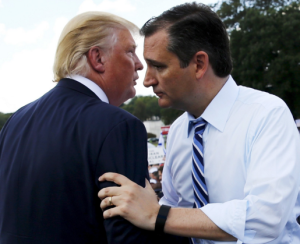In the past week, Donald Trump has been raising questions over Ted Cruz’s citizenship, suggesting that his Canadian birth could be a problem. Although he’s dominated most national and state polls for months, Trump still faces the chance of losing to Cruz in next month’s Iowa caucuses, which has led to him attacking his rival. Such behavior is a major change in strategy for both candidates; although Trump has seldom shied away from taking jabs at his opponents, until now he and Cruz have largely steered clear of each other. Yet Cruz, popular among evangelical Christians and conservatives, has become a favorite to win the first part of the nominating process, causing Trump to change up his strategy.
In interviews, Trump has addressed the issue of Cruz’s citizenship. Despite these insinuations, Cruz is still technically as eligible for the presidency, since his mother was a US citizen, making him a “natural born Citizen”. Nonetheless, some have continued to debate the definition of “natural born”. While Cruz meets the constitutional criteria, the Supreme Court has never weighed in on such a citizenship challenge, meaning that the issue has yet to be completely settled.
This isn’t the first time that a candidate’s status as a natural born Citizen has been an issue. In the 2008 Election, there was a large “birther movement” that tried to pressure Obama into proving he was actually born in the US. On the other side of the coin, John McCain was born in the Panama Canal Zone. Earlier on, the issue surfaced when Mitt Romney’s Mexican-born father tried to run for President in 1968. There was also a debate about Barry Goldwater, who was born in Arizona Territory in 1909, before it was admitted as a state.
Whether or not Trump’s strategy will be successful remains to be seen; Cruz has laughed off Trump’s suggestions, and remains extremely popular with the Republican Party’s conservative base. Trump, however, is still skeptical, and in an interview with Fox News said that Cruz might want to take the issue to court in an effort to alleviate any questions. Nonetheless, most voters in Iowa don’t seem to be viewing it as much of an issue.
